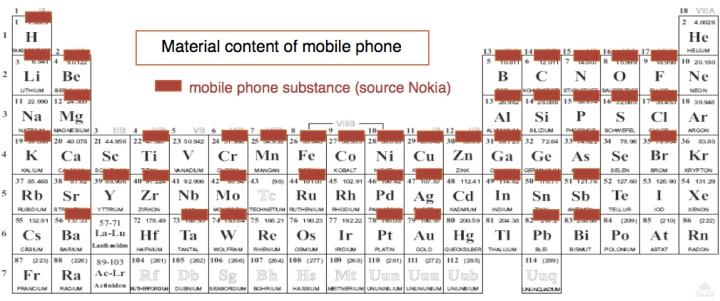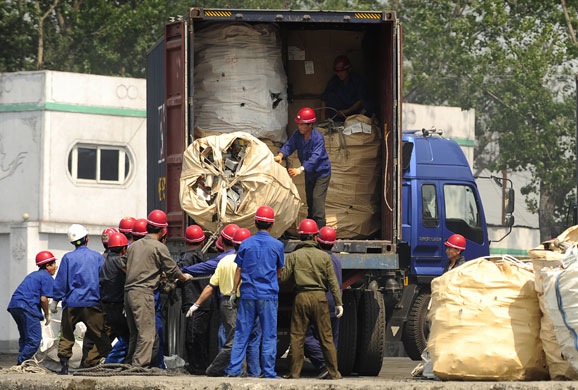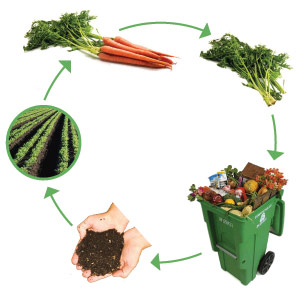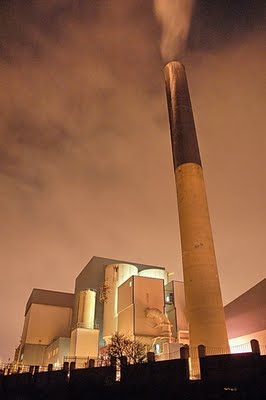UNEP Report Urges E-Waste Action, Focuses on China
 A new UN Environment Programme (UNEP) report – Recycling – from E-waste to Resources (pdf) – identifies the growing problem of e-waste internationally. Includes is the finding that, by 2020, computer related e-waste will be four times 2007 levels. More noteworthy still, is that developing countries – namely, India and China – will be the largest depositories for e-waste.
A new UN Environment Programme (UNEP) report – Recycling – from E-waste to Resources (pdf) – identifies the growing problem of e-waste internationally. Includes is the finding that, by 2020, computer related e-waste will be four times 2007 levels. More noteworthy still, is that developing countries – namely, India and China – will be the largest depositories for e-waste.
Whereas previous streams of e-waste originated from abroad, often imported under dubious conditions, the growing trend in China is domestically-generated e-waste, as NEEDigest has reported previously. This pattern matches with growing personal wealth and availability of cheap electronic goods and appliances: two factors combining to produce a culture of disposibility previously absent in China.
In the short-term, government policies may be exacerbating this trend. A small appliance-aimed “cash for clunkers”-type program launched in the fall has reportedly resulted in the disposal – and collection – of 2.39 million used home appliances, including televisions, PCs, refrigerators, washing machines, and air-conditioners within only a few months. But, as the UN report alludes and Shanghai Scrap’s Adam Minter has correctly pointed out, “China doesn’t yet have sufficient environmentally-secure capacity for recycling such a large quantity of used appliances.”
But, before we dive into that, let’s get back to the UN report.
China Diverting Toxic Waste to North Korea, Emerging Information Suggests
 China has taken considerable steps in recent years to address electronic waste management practices unsafe for the individuals involved and harmful to local land and water supplies, as NEEDigest has previously reported.
China has taken considerable steps in recent years to address electronic waste management practices unsafe for the individuals involved and harmful to local land and water supplies, as NEEDigest has previously reported.
However, China’s limited electronic waste recycling facilities and swelling consumption patterns has rendered domestic containment of toxic trash a serious problem.
Like China, the US and Europe face this predicament, and for years have exported trash to developing countries in Asia and Africa at a lower cost and with fewer environmental safeguards. It is therefore somewhat unsurprising, but no less disheartening, to find out that China, too, is joining the ranks of countries opting to manage waste by having less developed countries manage it for them – often at considerable health and environmental risks.
The newest recipient country is not in Africa or Southeast Asia, as one might expect.
Rather, it appears that waste is being diverted to North Korea, China’s northeastern neighbor, whose western coast lies directly across from China’s prosperous coastal areas and many port towns. This revelation contradicts certain assumptions that North Korea, its economic development stunted due to a centrally planned economy and isolation from the outside world, was comparatively free from the industrial pollution that beleaguers many of its East and South Asian counterparts.
Panyu Residents Victorious in Blocking Planned Incinerator, Expected to Meet 30% Recycling Target in Return
 To some, the surge of public action to oppose a planned incinerator in south China’s Panyu city may indicate growing popular environmental awareness, concern and activism in China. To others, the protests are testament to China’s growing urban wealth and the push for “not in my backyard” (NIMBY) movements that often accompany it.
To some, the surge of public action to oppose a planned incinerator in south China’s Panyu city may indicate growing popular environmental awareness, concern and activism in China. To others, the protests are testament to China’s growing urban wealth and the push for “not in my backyard” (NIMBY) movements that often accompany it.
Whether motivated by property values or public health, recent outcries have not been conducted in vain.
Citizen resistance has succeeded in blocking the government’s construction plans, confirmed when district Party secretary Tan Yinghua said in a meeting with local residents yesterday that the entire project would “start from the beginning.” The government pledged transparency and public engagement throughout all steps of the re-planning process, including the environmental assessment, feasibility study, and location decision, according to a report by state-run Xinhua media.
Both foreign and domestic media outlets credit this outcome to the public push back that began last month.
Government, Backed into a Corner on Public Incinerator Concerns, Pushes Back
Beijing municipal officials recently announced plans to continue with seven incinerator projects in the Beijing area, despite protests of nearby residents.
As we have reported before, Beijing’s trash is growing at approximately 8% annually, though the city is capable of treating just over half of what it tosses. Currently, 90% of Beijing’s solid municipal waste is sent to area landfills.
Though source waste reduction, improved recycling programs and more active resident seperation are among the many options available for addressing the problem, local and central level officials have prioritized the building of more incineration plants as their preferred approach.
This stance, combined with a lack of regulatory oversight and monitoring necessary to ensure the plants’ safety and environmental standards, has stirred dissatisfaction among local residents, and prompted vocal protests unseen in years past.
TALKING TRASH: Shanghai
TALKING TRASH: Shanghai explores one city’s measure of success in improving waste treatment by implementing changes at all levels of waste management.
TALKING TRASH: Beijing



leave a comment